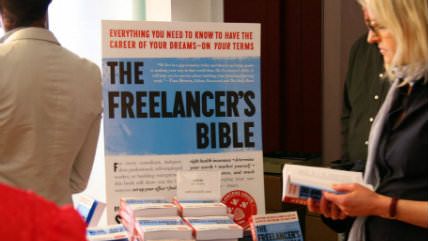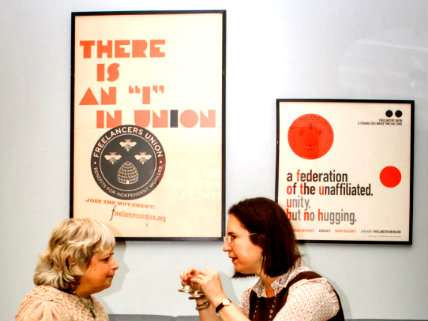Is American Entrepreneurship Declining or Simply Changing?
A parallel trend to the new-business nosedive is the rise of the freelance economy.

It's a counter-intuitive question: Where have all the entrepreneurs gone? We're incessantly hearing about new startups these days—scrappy innovators that harness technology to conquer cultural Goliaths; labors of love launched with seed money from Kickstarter; home cooks turned culinary capitalists. But researchers from The Brookings Institution claim that American entrepreneurship is in decline.
"Historically one new business is born about every minute, while another one fails every eighty seconds," write Brookings economists Ian Hathaway and Robert Litan in their paper, "Declining Business Dynamism in the United States." All of this "churning" and "creative disruption" is a good thing, they say, because it helps long-run economic growth by spurring new job creation.
But Hathaway and Litan pinpoint a "precipitous drop" in new startups since 2006, and a slower but steady drop since the late '70s. The result is an economy oversaturated with mature companies, the pair fret in a follow-up paper. In 1992, just 23 percent of U.S. businesses had been around for 16 years or more. By 2011, such companies represented 34 percent of all U.S. businesses. And this "aging" of the U.S. economy "has occurred in every state and metropolitan area, every firm size and category, and in each broad industrial sector," the researchers found.
In relaying these findings in The Washington Post, Robert Samuelson seems to have fully bought-in to this anti-dynamism narrative and then some. Samuelson writes that "the economy's rejuvenation from below is weakening" and "the Internet's influence exaggerated". He concludes that the idea of new, tech-savvy companies replacing older, outdated ones "may be wishful thinking that conceals deeper forces holding the economy back."
In a second op-ed, Samuelson explores some ideas about why entrepreneurship may be declining, from too much government regulation to too little investment capital. He's skeptical this "laundry list of gripes shared by many businesses, new and old" can fully explain it, however he offers no ulterior explanation save that perhaps we're "a society whose members are getting older…more risk adverse and less adventurous".
But let's take a closer look at the underlying premise here. Could the economists (and by extension Samuelson) be seeing an abundance of older entrepreneurs and companies because they're looking at entrepreneurship in an old way?
"Holding all factors constant, we'd expect an economy with greater concentration in older firms and less in younger firms to exhibit lower productivity, potentially less innovation, and possibly fewer new jobs created than would otherwise be the case," write Hathaway and Litan. But other factors are far from constant. A parallel trend to this startup nosedive is the rise of the freelance economy.
The New Entrepreneurs

As of 2005, there were 42.6 million "contingent workers" in the U.S. workforce, according to the first and only report on this population from the Government Accountability Office (GAO). Contingent worker is a broad term which GAO uses to describe independent contractors, temp workers, the self-employed, day laborers, on-call workers (such as substitute teachers), and anyone engaged in part-time work. Excluding the part-time workers—which includes some we might traditionally think of as freelancers and some working part-time at The Gap—we're still left with about 18.3 million in the contingent workforce.
Unfortunately there's no data on whether the proportion of contingent workers has grown since the recent recession. But I think it's fair to assume it has increased, considering economic realities and all the attention paid to the rise of what's often called the "sharing economy." Sara Horowitz, founder of the 244,000-member Freelancers Union, calls it the "new mutualism." From the organization's website:
We're lawyers and nannies. We're graphic designers and temps. We're the future of the economy. Freelancers Union serves the needs of this growing independent sector. We're bringing freelancers together to build smarter solutions to health care, retirement, wage security, and other broken systems. We call it New Mutualism. You can call it the future.
Whatever you call it, an under-appreciated aspect of this economy is how it puts self-employment, of sorts, in many more people's reach. Sure, companies like Uber, Lyft, and AirBnB (to name just a few prominent examples) are making things easier for consumers. And they often come with neat origin stories, too. But they're also allowing individuals "to bring their marginal capital and/or labor into productive use," as the R Street Institute put it. They're granting more workers more autonomy.
Take Bellhops, a small-scale moving company founded by two recent college graduates in 2011. It may not be providing many of the kinds of jobs official data is measuring. But in a few short years, it's come to employ more than 2,000 students as independent moving contractors. Movers are paid $13-$15 per hour, can choose when they take jobs, and decide whether they want to take a lead or "wingman" roll on each.
"Being a Bellhop is very much an entrepreneurial position," says COO Matt Patterson. "They're essentially running their own business. If they pick up a moving job at 8 a.m. on Saturday morning, they chose to be there, which has a huge impact on our customer service levels. The Bellhop wasn't forced by upper management to do so."
The model is good for customer service and good for busy student schedules. But it's obviously not just students who take to flexible work. Whether it stems from a lack of alternative employment options or a conscious career choice, workers of all ages are increasingly cobbling together a living from an array of entrepreneurial activities.
An April 2014 poll from Gallup found one third of microbusiness owners—microbusinesses are defined as those with zero to 10 employees—rely on a second job for income. AirBnb found more than 50 percent of its hosts in New York were non-traditional workers (freelancers, students, etc.). "The entire notion of what 'freelancing' entails is changing," says the Freelancers Union.
"Before, it was gig-based and a freelancer's jobs were mainly limited to their professional field. But that's the past. The new "freelancing" is different—more flexible, more diversified, more anchored in the sharing economy. Today, a freelancer could have a couple of graphic design clients, but she also could have a portfolio of other jobs, like renting her spare room on Airbnb and driving a car for Lyft and working in her local food co-op and scoring some singing gigs on the weekends."
Living in Brooklyn, I was surrounded by people who split their time between creative or professional pursuits, part-time service jobs, temp work, and any number of odd money-making endeavors: teaching yoga, busking in the Subway, selling jewelry on Etsy, selling homemade food at local markets, renting rooms on AirBnB, teaching cooking classes, teaching at local co-working spaces, writing for content mills, designing websites, serving as photographers' assistants, working as part-time movers and dominatrixes and beekeepers.
Traditionally, we may have referred to these folks as "self-employed." But many of them would self-identify as "entrepreneurs." In a 2013 survey of freelancers—3,193 respondents, including 1,958 millennials—90 percent said that being an entrepreneur is a "mindset," rather than strictly someone who starts a company. Of the millennial freelancers familiar with the term entrepreneur, 58 percent classified themselves as one.
Regardless of whether we call Uber drivers and freelance coders and Etsy emporium keepers "entrepreneurs", this rise in freelancing/self-employment/microbusinesses is happening. And it shows no signs of reversing course, which comes with both some good and some bad. Some will undoubtedly lament that outside the full-time employment contract, workers lose out on aspects of the 20th-century safety net. Many will fret that this new model of employment doesn't provide as much security as the old way. The Brookings economists were concerned about a lack of new startups leading to a lack of new jobs.
But this is what we have. And people are finding ways to make it work. People are creating their own jobs, becoming businesses of one, absorbing the (annoyingly true) post-modern message that you are your own personal brand. Non-employer microbusiness owners now make up 44 percent of all U.S. business owners overall, according to Gallup. It's certainly plausible that these trends may be countering some of the job and innovation deficit created by the lack of traditional startup launches.
So how can we accommodate this economy? How do we bolster these new entrepreneurs? What kind of healthcare solutions, financial products, and services—co-working spaces, community kitchens, small business incubators—will appeal to and assist this crowd? How can we adjust the tax code to ease the burden on the self-employed? (A middle-class tax cut if there ever was one.) What kind of regulations could be repealed or changed to help them thrive?
Entrepreneurship isn't declining, it's changing. How can we adjust our policy prescriptions and cultural expectations accordingly?


Show Comments (53)